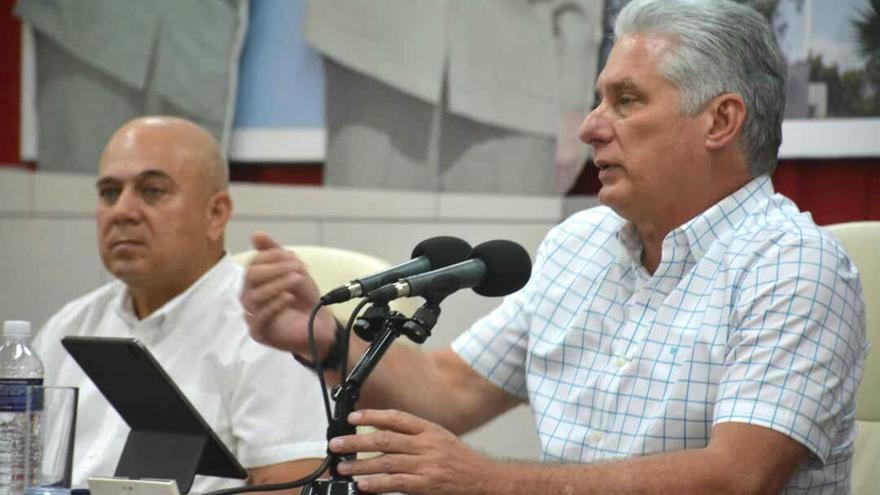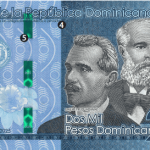
Miguel Díaz-Canel found a new scapegoat this Friday to justify the fuel crisis in Cuba. “What happened to the gasoline?” Was the question asked in a confessional tone during a meeting with leaders of the Communist Party in Villa Clara. “The countries that have certain commitments with us to supply us with gasoline based on the agreements we have have also been in a complex energy situation,” she concluded.
The “non-compliances” of others – which seem to point, above all, to Venezuela – can be translated into figures: “Of between 500 and 600 daily tons of gasoline that the country consumes, at the moment we are with coverage of less than 400”, he calculated. In addition, the Government acts “without being very clear” about how it is going to “get out of the situation.”
After acknowledging that there was no clear, long-term strategy to address the problem, he suggested that it was best to resign: “This has nothing to do with inefficiencies in the country or with problems in our energy institutions, but with non-compliance that has also occurred for very objective reasons that the countries that supply us have,” he said, without going into detail about the problems Venezuela is facing.
Regarding diesel, he assured that the cause of his deficit was “different” and that it could be attributed to “cyclical problems”
Regarding diesel, he assured that the cause of his deficit was “different” and that it could be attributed to “cyclical problems”. “We had guaranteed shipment, but the ship broke down in Santiago de Cuba and prevented it from being unloaded in time so that it could later continue to other ports. This has caused us a delay in the way in which we have been able to distribute that fuel,” he explained. , without specifying if he was talking about the oil tanker Nolanwhich was loading 1.53 million barrels (400,000 of fuel oil and 1.13 of heavy oil) bound for Cuba.
He also referred to the “strategy to avoid blackouts in the summer,” in a context where most of the island’s thermoelectric power plants are “resolving breakdowns or undergoing maintenance.” “We have had to rely more on distributed power generation, which generally consumes diesel,” he said.
The official press welcomed Díaz-Canel’s visit to Santa Clara, the city that nominated him for a new legislature of the Cuban Parliament and in which he carried out a sustained campaign during the elections last March. cubadebate admitted that the president was arriving in central Cuba “in the midst of a complex energy situation, which has generated great concern among the population,” and celebrated Díaz-Canel’s contrition in the face of the successive crises that “complicate the life of Cubans.” In addition, he applauded that he criticized “the deficiencies of the Party’s work in Villa Clara” and that he himself carried out his “self-criticism”.
Despite Díaz-Canel’s “resignation”, the fuel crisis continues to worsen as summer approaches. The imminence of the hottest months augurs a repeat of the long blackouts that only gave Cubans a truce in December 2022, but which gained strength again in January of this year.
Until now, the most serious symptom is manifested in transportation, since a large part of the island’s vehicles are paralyzed or have to face long lines in front of the gas stations, and who are required to prove that they belong to an authorized ministry or company. or to embassies.
Until now, the most serious symptom is manifested in transportation, since a large part of the vehicles on the Island are paralyzed or have to face long lines.
However, data Published by the Reuters agency reveal that Cuba receives a constant supply of fuel, and that 980,000 barrels of oil were distributed from Russia alone in March, together with Panama and Uruguay, another sign of the strengthening of economic ties between the Kremlin and Havana.
The new rationing rules at gas stations shows that this supply rarely benefits Cuban drivers, and that despite the failures of the last harvest, Russia seems determined to reactivate sugar production on the island and some agricultural activities by sending its oil to the country.
In addition to Moscow, Havana has its oil partner par excellence in Caracas. Several agreements, which were reactivated by a recent visit by Raúl Castro to the Venezuelan capital, guarantee that the island will be the port of arrival for numerous tankers from Venezuela.
Added to this panorama is the movement along the Cuban coast of the floating power plants sent by Turkey to alleviate the energy deficit on the island. The patana erin sultanwhich left Havana on Tuesday for Santiago de Cuba, should arrive this Saturday at its destination, to replace the irem sultanwho arrived in the capital of the East less than a month ago.
Meanwhile, other ships of the Karadeniz Powership company, the suheyla sultan and a small tugboat. The most obvious correlate of the instability of Cuban energy chess, for which the worst months are still awaiting, is in the blackouts that Cubans are already beginning to suffer, the duration of which is increasing.
________________________
Collaborate with our work:
The team of 14ymedio He is committed to doing serious journalism that reflects the reality of deep Cuba. Thank you for accompanying us on this long road. We invite you to continue supporting us, but this time becoming a member of our newspaper. Together we can continue transforming journalism in Cuba.
















